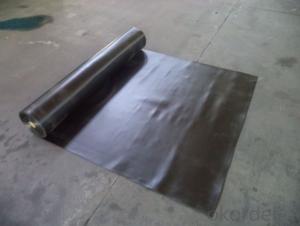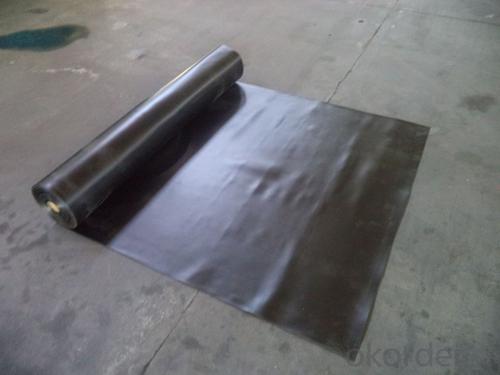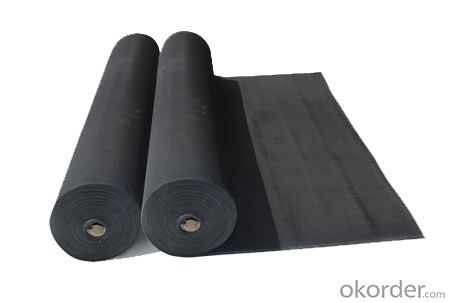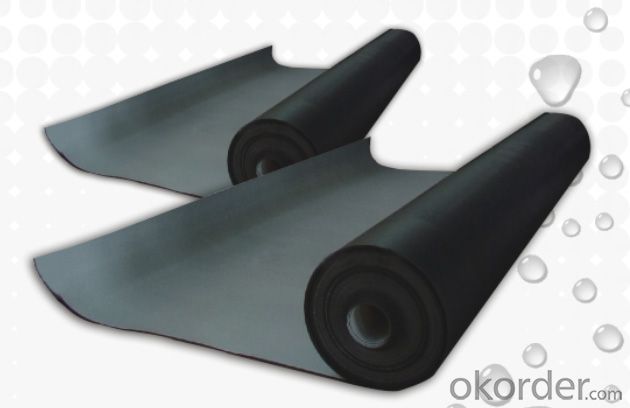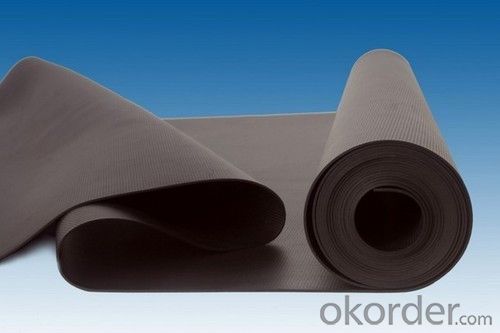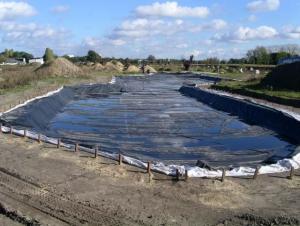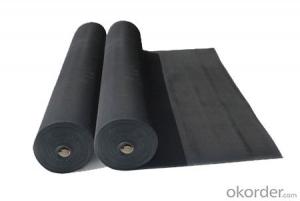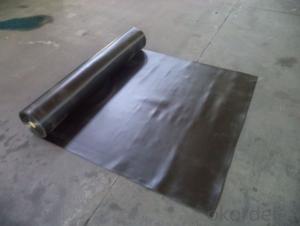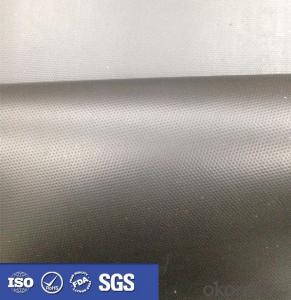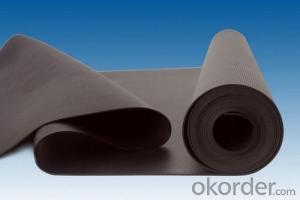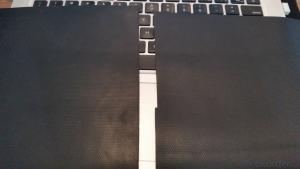EPDM Waterproof Weldable Membrane with 1.5mm Thickness
- Loading Port:
- Shanghai
- Payment Terms:
- TT OR LC
- Min Order Qty:
- 20000 m²
- Supply Capability:
- 5000000 m²/month
OKorder Service Pledge
OKorder Financial Service
You Might Also Like
EPDM Waterproof Weldable Membrane with 1.5mm Thickness
Description Of EPDM Waterproof Weldable Membrane with 1.5mm Thickness:
1. EPDM waterproof membrane is made from ternary ethylene-propylene rubber, which is for waterproofing of exposed and non-exposed applications.
2. EPDM waterproof membrane production adopts the world-advanced equipment of cold feeding extrusion and continuous vulcanization technology.
3. EPDM waterproof membrane is of high elasticity among high polymer waterproof materials and becomes a world-popular waterproofing material.
Main Features of EPDM Waterproof Weldable Membrane with 1.5mm Thickness:
1.Excellent anti-aging performance, service life can reach 50 years;
2.High elongation, high tensile strength, heat treatment size change small;
3.Plant root penetration resistance is good
4.Good low temperature flexibility
5.Application is convenient, overlapping is firm and reliable, no environmental pollution;
6. Resistance to chemical corrosion, can be applied to special places;
7.Maintenance is convenient, the cost is low
Specifications of EPDM Waterproof Weldable Membrane with 1.5mm Thickness:
ITEM | STANDARO REQUEST | |
Tensile strength at breaking,normal temperature,Mpa | ≥7.5 | |
Elongation at breaking, % | ≥450 | |
Tearing strenght,KN/m | ≥25 | |
Bending at low temperature | ≤-40°C | |
Water impermeability,0.1Mpa×30min | Impermeability | |
Hot air aging 80°C×168h | Unchanging of tensile strength at breaking,% | ≥80 |
Unchanging of elongation at breaking,% | ≥70 | |
Appearance of 100% elongation | No crack | |
Property of anti alkali 10% Ca(OH)2×168h normal temperature | ≥80 | |
≥80 | ||
Applications of EPDM Waterproof Weldable Membrane with 1.5mm Thickness:
1.Roofs, Basement, Toilets
2. Industrial and civil building waterproofing
3. Geosynthetic liner for swimming pool, channels, irrigation system
4. Especially suitable for projects with high requirements in durability, anti-corrosion and deformation.
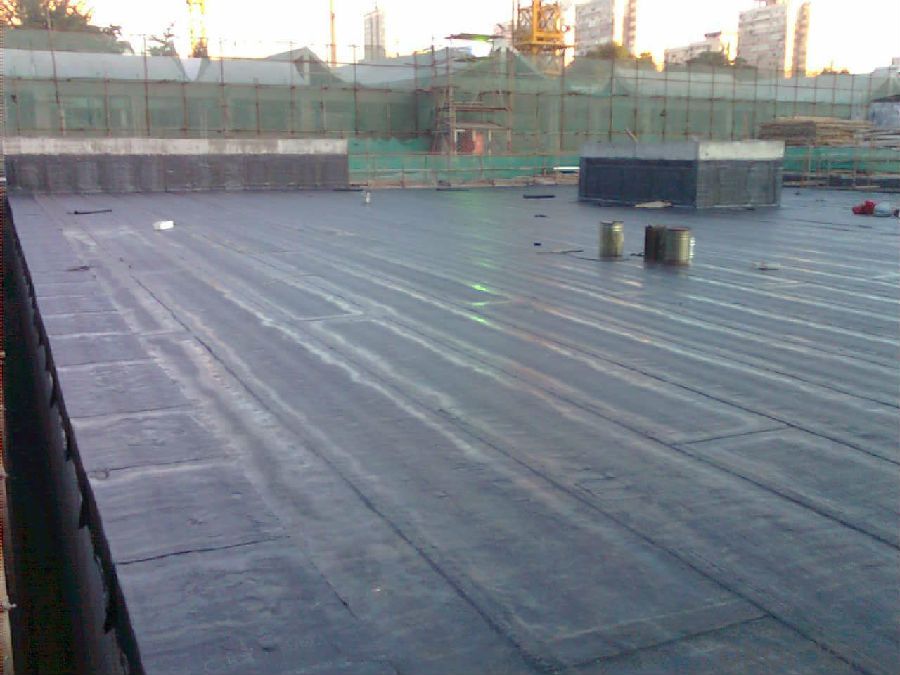
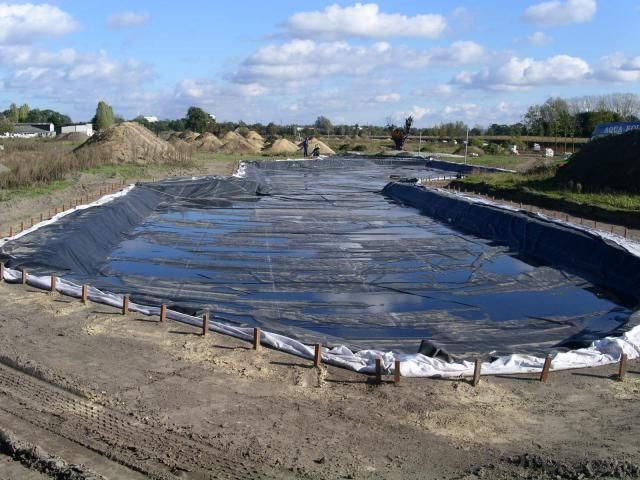
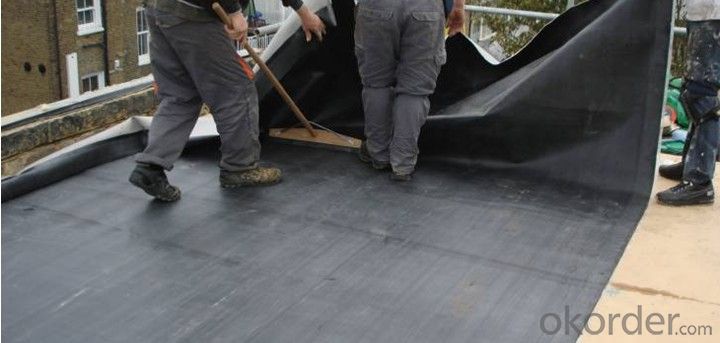
IMages of EPDM Waterproof Weldable Membrane with 1.5mm Thickness:
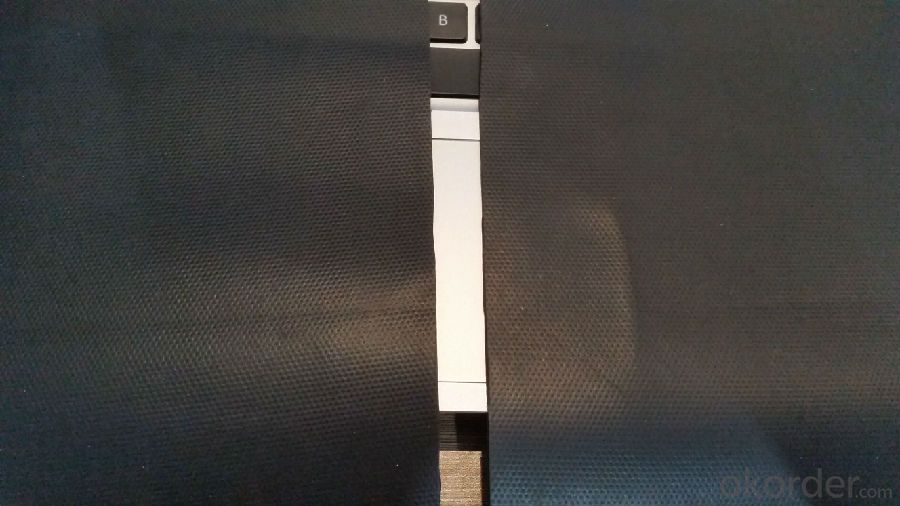
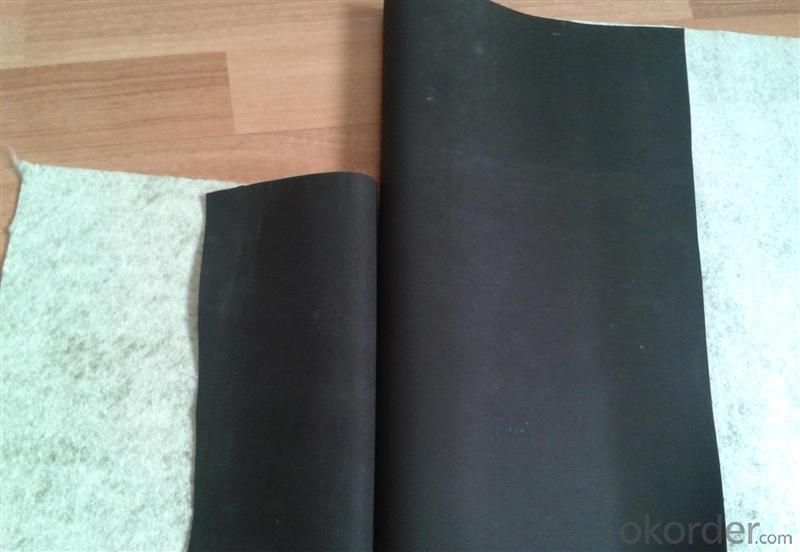
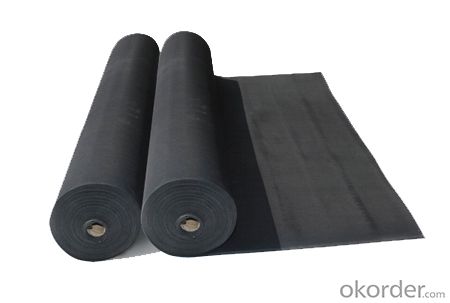
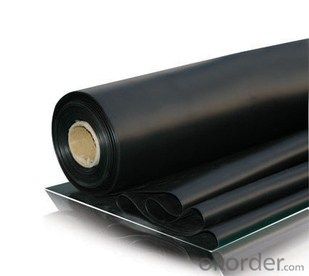
FAQ of EPDM Waterproof Weldable Membrane with 1.5mm Thickness:
1. What are we supplying?
We are specialized in producing Colorful Asphalt Roof Shingle, SBS/APP modified bitumen waterproof membrane, Self adhesive bitumen waterproof membrane, PVC waterproofing membrane, EPDM rubber roofing membrane, Single Component Polyurethane Waterproof Coating, and Spray Polyurea Waterproof Coating
.
2. How Many years experience do we have?
We have been exported to more than 20 countries in the past 15 years.
3. How long do we usually reply your request?
We always reply our customer within 24 hours.
- Q: Is a waterproofing membrane resistant to rodent or insect infestation?
- A waterproofing membrane has the ability to resist infestation from rodents or insects. Most waterproofing membranes are constructed using materials that rodents or insects find unappealing, such as bitumen or synthetic polymers. Furthermore, these membranes are typically installed in a manner that eliminates any gaps or openings through which pests could enter. However, it should be noted that no waterproofing system is completely impervious to infestation. If there are existing entry points or if the membrane is damaged or improperly installed, rodents or insects may still be capable of breaching the waterproofing system. Regular inspection and maintenance are essential to ensure the integrity of the waterproofing membrane and to prevent any infestation from occurring.
- Q: Can a waterproofing membrane be used on roofs with rooftop gardens?
- Indeed, rooftops with gardens can benefit greatly from the utilization of a waterproofing membrane. Employing a waterproofing membrane is strongly advised as it shields the foundational framework from harm caused by water. Given that a rooftop garden contributes additional weight and moisture to the roof, it is imperative to have a reliable waterproofing system in place to avert leaks and guarantee the roof's durability. The waterproofing membrane serves as a safeguard against water infiltration, effectively maintaining dry conditions for both the rooftop garden and the underlying structure.
- Q: Can a waterproofing membrane be used on precast chrome surfaces?
- Yes, a waterproofing membrane can be used on precast chrome surfaces. The membrane will provide a protective barrier against water penetration, ensuring the durability and longevity of the precast chrome surfaces.
- Q: Can a waterproofing membrane be used on tunnels with ventilation systems?
- Yes, a waterproofing membrane can be used on tunnels with ventilation systems. In fact, it is commonly used to prevent water infiltration and protect the structure of the tunnel. The membrane is installed on the exterior walls and ceiling of the tunnel, ensuring that any water that may enter is diverted away from the tunnel and its ventilation system. This helps to maintain the integrity of the tunnel and ensures proper functioning of the ventilation system.
- Q: Can a waterproofing membrane be used for a parking garage deck protection?
- Indeed, the utilization of a waterproofing membrane is a viable option for safeguarding the parking garage deck. Designed with the specific purpose of preventing water infiltration and shielding the underlying structure from moisture-related harm, a waterproofing membrane proves to be highly effective in such scenarios. When applied to the parking garage deck, the waterproofing membrane acts as a barrier, effectively preventing water from permeating the concrete and reaching the steel reinforcement beneath. This, in turn, mitigates the risk of corrosion and deterioration, ultimately prolonging the lifespan of the structure and minimizing the need for expensive repairs or replacements. Moreover, the waterproofing membrane offers protection against other potential sources of damage, including oil or chemical spills resulting from vehicular activity. By creating a barrier, it successfully hinders these substances from penetrating the concrete and causing unsightly stains or deterioration. Supplementary to its protective capabilities, the waterproofing membrane enhances the overall durability and strength of the parking garage deck. It aids in the reduction of cracking, spalling, and other forms of concrete damage that may arise due to freeze-thaw cycles, temperature fluctuations, or heavy loads. All in all, opting for a waterproofing membrane to safeguard the parking garage deck is a highly recommended solution for ensuring the longevity and structural integrity of the facility. By providing a dependable defense against water infiltration, chemical spills, and other potential sources of damage, it serves to decrease maintenance expenses and extend the lifespan of the parking garage deck.
- Q: Can a waterproofing membrane be used in conjunction with drainage systems?
- Yes, a waterproofing membrane can be used in conjunction with drainage systems. The membrane provides a barrier to prevent water penetration, while the drainage system helps to channel and remove any water that may accumulate. This combination ensures effective and comprehensive waterproofing for various applications such as basements, roofs, and underground structures.
- Q: How does a waterproofing membrane handle movement of a building due to settling or seismic activity?
- A waterproofing membrane is designed to handle movement of a building caused by settling or seismic activity by providing flexibility and elasticity. It can accommodate small shifts and vibrations without cracking or breaking, ensuring that the waterproof barrier remains intact. The membrane's ability to stretch and contract helps it to adapt to the movement of the structure, preventing water intrusion and maintaining its effectiveness in safeguarding the building against moisture damage.
- Q: Can a waterproofing membrane be used on tunnels with communication systems?
- Indeed, tunnels with communication systems can utilize a waterproofing membrane. It is strongly advised to shield delicate communication equipment and wiring from water-induced harm. A waterproofing membrane is specifically engineered to establish a protective barrier against water infiltration, thus averting leaks and seepage. By implementing a waterproofing membrane on the walls and floors of the tunnel, the communication systems can be shielded against possible water-related complications, including corrosion, short circuits, and disruption of signals. It is crucial to select a waterproofing system that aligns with the precise needs and prerequisites of the communication systems within the tunnel to guarantee optimum protection and functionality.
- Q: Can a waterproofing membrane be used for bridge abutments?
- Yes, a waterproofing membrane can be used for bridge abutments. Waterproofing membranes are commonly used in construction to prevent water infiltration and protect structures from moisture damage. Bridge abutments, as critical components of bridge infrastructure, can benefit from the installation of a waterproofing membrane to ensure long-term durability and structural integrity.
- Q: Can a waterproofing membrane be used on precast gypsum surfaces?
- Yes, a waterproofing membrane can be used on precast gypsum surfaces. This membrane acts as a barrier to prevent water penetration and can be applied to protect the gypsum surface from moisture damage.
Send your message to us
EPDM Waterproof Weldable Membrane with 1.5mm Thickness
- Loading Port:
- Shanghai
- Payment Terms:
- TT OR LC
- Min Order Qty:
- 20000 m²
- Supply Capability:
- 5000000 m²/month
OKorder Service Pledge
OKorder Financial Service
Similar products
Hot products
Hot Searches
Related keywords
